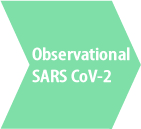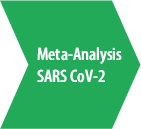Hydroxychloroquine has been found to have in-vitro antiviral activity against SARS-CoV-2. Hydroxychloroquine has been demonstrated to be effective at impairing viral replication. The mechanism of action has been thought to be the prevention of viral binding to the angiotensin converting enzyme 2 (ACE-2) receptor by the inhibition of terminal glycosylation. Hyroxychloroquine has also been thought to have the ability to incorporate into endosomes and lysosomes, thereby resulting in an increase in the pH of intracellular compartments.
At this time, there is insufficient evidence with regards to the clinical efficacy of either chloroquine or hydroxychloroquine in the prevention or treatment of COVID-19 disease, outside of a clinical trial.
We do not recommend the routine use of hydroxychloroquine or chloroquine in either the outpatient or inpatient setting for the treatment of either mild, moderate, or severe COVID-19 disease.
 = Supporting use article = Supporting use article |
 = Neutral Article = Neutral Article |
 = Contradicting use article = Contradicting use article |

 |
 |
 |
  |
  |
 |
Major Peer-Reviewed Studies
 Randomized Control Trials:
Randomized Control Trials:
 On June 5, 2020 – the chief investigator of the Randomized Evaluation of COVid-19 thERapY (RECOVERY) Trial on hydroxychloroquine published that after enrolling 11,000 patients throughout the UK, the Data Monitoring Committee after reviewing the data suggested to investigators to proceed and review the unblinded literature. After review of the literature, the investigators decided to stop enrolling participants to the hydroxychloroquine arm. It was noted that “A total of 1542 patients were randomised to hydroxychloroquine and compared with 3132 patients randomised to usual care alone. There was no significant difference in the primary endpoint of 28-day mortality (25.7% hydroxychloroquine vs. 23.5% usual care; hazard ratio 1.11 [95% confidence interval 0.98-1.26]; p=0.10). There was also no evidence of beneficial effects on hospital stay duration or other outcomes.”
On June 5, 2020 – the chief investigator of the Randomized Evaluation of COVid-19 thERapY (RECOVERY) Trial on hydroxychloroquine published that after enrolling 11,000 patients throughout the UK, the Data Monitoring Committee after reviewing the data suggested to investigators to proceed and review the unblinded literature. After review of the literature, the investigators decided to stop enrolling participants to the hydroxychloroquine arm. It was noted that “A total of 1542 patients were randomised to hydroxychloroquine and compared with 3132 patients randomised to usual care alone. There was no significant difference in the primary endpoint of 28-day mortality (25.7% hydroxychloroquine vs. 23.5% usual care; hazard ratio 1.11 [95% confidence interval 0.98-1.26]; p=0.10). There was also no evidence of beneficial effects on hospital stay duration or other outcomes.”
Randomized Trials With Moderate – Severe Bias:
- Chen Zhaowei et al. Efficacy of Hydroxychloroquine in patients with COVID-19: results of a randomized clinical trial
- Chen Jun et al. A pilot study of Hydroxychloroquine in treatment of patients with common coronavirus disease-19 (COVID-19)
- Wei Tang et al.Hydroxychloroquine in patients with COVID-19: an open-label, randomized, controlled trial
- Borba et al. Effect of High vs Low Doses of Chloroquine Diphosphate as Adjunctive Therapy for Patients Hospitalized With Severe Acute Respiratory Syndrome Coronavirus 2 (SARS-CoV-2) Infection A Randomized Clinical Trial
 Observational Trials:
Observational Trials:
 Geleris J, Sun Y, Platt J, Zucker J, Baldwin M, Hripcsak G, et al. Observational Study of Hydroxychloroquine in Hospitalized Patients with Covid-19. The New England journal of medicine. 2020.
Geleris J, Sun Y, Platt J, Zucker J, Baldwin M, Hripcsak G, et al. Observational Study of Hydroxychloroquine in Hospitalized Patients with Covid-19. The New England journal of medicine. 2020.
- Study Design: Observational Study
- Study Population: Hospitalized patients in New York, 1376 patients were included in the analysis
- Intervention: Hydroxychloroquine 600 mg BID on day 1, then 400 mg daily for a median of 5 days.
- Primary Outcomes: Composite of intubation or death in a time-to-event analysis
- Outcome: The use of hydroxychloroquine was not associated with a lower or increased risk of intubation or death than those who did not.
Observational (Retrospective/Prospective) Trials With Moderate – Severe Bias:
- Mahevas et al.No evidence of clinical efficacy of Hydroxychloroquine in patients hospitalized for COVID-19 infection and requiring oxygen: results of a study using routinely collected data to emulate a target trial.
- Molina et al. No Evidence of Rapid Antiviral Clearance or Clinical Benefit with the Combination of Hydroxychloroquine and Azithromycin in Patients with Severe COVID19 Infection. Médecine et Maladies Infectieuses 2020.
- Joseph Magagnoli et al. Outcomes of hydroxychloroquine usage in United States veterans hospitalized with Covid-19.
- Alexis Mathian et al. Clinical course of coronavirus disease 2019 (COVID-19) in a series of 17 patients with systemic lupus erythematosus under long-term treatment with hydroxychloroquine.
- Mercuro et al. Risk of QT Interval Prolongation Associated With Use of Hydroxychloroquine With or Without Concomitant Azithromycin Among Hospitalized Patients Testing Positive for Coronavirus Disease 2019 (COVID-19).
- Yu et al. Hydroxychloroquine application is associated with a decreased mortality in critically ill patients with COVID-19.
Studies that have been retracted or flagged due to ethical, methodological or statistical concerns:
- Mehra MR, Desai SS, Ruschitzka F, Patel AN. Hydroxychloroquine or chloroquine with or without a macrolide for treatment of COVID-19: a multinational registry analysis. Lancet. 2020.
- Mehra et al.
- Barbosa Esper et at. Empirical treatment of hydroxychloroquine and azithromycin for suspected cases of COVID-19 followed-up by telemedicine. Pre-print. 2020.
- Davido et al. Hydroxychloroquine plus azithromycin: a potential interest in reducint in-hospital morbidity due to COVID-19 pneumonia (HI-ZY-COVID)
Prophylaxis with hydroxychloroquine studies
Pre-exposure prophylaxis (PrEP) with hydroxychloroquine for high risk healthcare workers:
- There are currently several studies, either completed or actively enrolling, looking to examine the use of hydroxychloroquine as pre-exposure prophylaxis in healthcare workers at high risk of acquiring COVID-19.
- There is no published data, to date, to support the routine use of hydroxychloroquine as pre-exposure prophylaxis.
Post-exposure prophylaxis (PEP) with hydroxychloroquine for persons exposed to COVID-19:
- There is currently one high quality randomized, double blind, placebo controlled trial looking at the use of hydroxychloroquine for persons exposed to COVID-19.
- There are several ongoing studies examining the efficacy of hydroxychloroquine in post-exposure prophylaxis.
- Boulware DR, Pullen MF, Bangdiwala AS, Pastick KA, Lofgren SM, Okafor EC, et al. A Randomized Trial of Hydroxychloroquine as Postexposure Prophylaxis for Covid-19. The New England journal of medicine. 2020.
- Randomized, double-blind, placebo-controlled trial across the United States and Canada.
- Study participants were adults with household or occupational exposure to someone with confirmed COVID-19.
- Study Intervention - hydroxychloroquine 800 mg once, followed by 600 mg in 6 - 8 hours, hen 600 mg for an additional 4 days vs. placebo (folate).
- Primary outcome - incidence of laboratory confirmed COVID-19 disease or illness that is clinically compatible with COVID-19 disease.
- Main Results -Hydroxychloroquine did not prevent confirmed COVID-19 or COVID-19 compatible illness vs. placebo.
Use of hydroxychloroquine for treatment of COVID-19
Use of hydroxychloroquine for outpatient treatment of COVID-19:
- There are currently several clinical trials, either completed or actively enrolling, looking to assess the efficacy for the use of hydroxychloroquine in the outpatient treatment of COVID-19.
- There is insufficient data to recommend the routine use of hydroxychloroquine for outpatient therapy of COVID-19 outside of a clinical trial.
Use of hydroxychloroquine for inpatient treatment of COVID-19:
- There have been many publications to date and many ongoing studies looking at the efficacy of hydroxychloroquine or chloroquine in the treatment of COVID-19 in hospitalized patients. Many of the publications have suffered from moderate to severe biases because of methodology, small sample size, no control group, inability to control for confounders.
- There is insufficient data to recommend the routine use of hydroxychloroquine for inpatient therapy of COVID-19 outside of a clinical trial.